There must be a Marlboro: President Ellen’s legacy
By Peter T. Mallary ’76
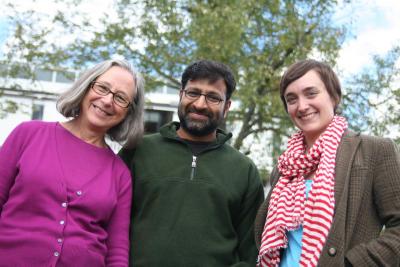
I remember Ellen’s inauguration as Marlboro College’s eighth president very clearly. Her address was powerful stuff. She just seemed to get it about Marlboro. Surely her many years of a real and deeply felt connection to Vermont helped lead her to an appreciation of what she called the “beautiful village on the hill.” But it was more than that. She clearly saw why Marlboro College matters. In her speech she summed up a vision of, and mission for, the college that matched our long held self-image: commitment to community and intellectual accomplishment. Her poignant refrain echoed, “There must be a Marlboro.” This June, 11 years later, Ellen McCulloch-Lovell leaves the college with that commitment refreshed and with the institution demonstrably stronger.
What Ellen brought us that day was exciting. Her résumé was impressive; Bennington College, Vermont Council on the Arts, 10 years as Vermont Senator Patrick Leahy’s chief of staff, high-level service to both the president and the first lady in the Clinton White House, and most recently heading the Veteran’s History Project at the Library of Congress. As her friend Hillary Clinton once advised her, Ellen had learned “how to pull the levers” in government and beyond.
Ellen recalls sitting in her office and receiving a call from a head-hunting firm asking her for her thoughts about Marlboro College. Assuming they were interviewing her for background information she offered her warm impressions of the college, knowing the place because of summer visits to the music festival and professional relationships with some faculty. The caller then came to the point. What about Ellen McCulloch-Lovell as a candidate for the job of president of Marlboro?
“Absolutely not!” She had no experience in the academic world, she said, and her husband Chris would have to leave his tenured university position. Ellen did offer to help them find some other candidates. But they were persistent. A few calls later—homesick for Vermont and with a sense that this was a leadership challenge she might want to take on—she threw her résumé in the ring.
Ellen has presided over Marlboro College with warmth, dedication, and passion. She leaves behind a campus strengthened by her foresight in financial planning, aware of the challenges facing us in the market of higher education, and engaged as a community in continually articulating and refining our vision. I will miss her enthusiastic leadership, her ever-present support of our students (including her frequent presence in the audience at dance performances), as well as her warm friendship.
—Kristin Horrigan, dance faculty
“I fell in love,” she says. “I drove up the hill and said ‘I’m home. I’ve found a true intellectual community that also really cares about people’s participation in the world, and I want to be here.’” And as she left the on-campus interviews—watching snow fall on Potash Hill—she knew this was a job she wanted.
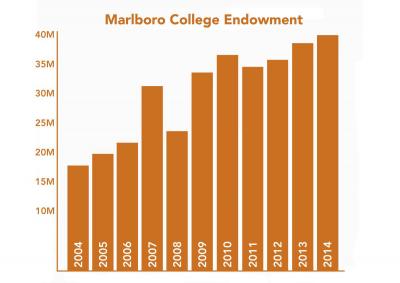 What Ellen leaves behind at Marlboro is impressive. Fiscally the college has never been stronger. During Ellen’s tenure the endowment has grown from $16 million to more than $40 million (see chart right). The endowment per student meets the highest national standards. It also leaves the college with the ability to commit substantial resources to broadcasting Marlboro’s unique story far afield. All this has been accomplished in spite of international economic trauma. Though she is quick to give her predecessors credit for building an endowment foundation, there is no question that this president has brought special skills to the art of donor relations and fundraising in general. She has a gift for telling the college’s story—and convincing people that they want to be a part of that story.
What Ellen leaves behind at Marlboro is impressive. Fiscally the college has never been stronger. During Ellen’s tenure the endowment has grown from $16 million to more than $40 million (see chart right). The endowment per student meets the highest national standards. It also leaves the college with the ability to commit substantial resources to broadcasting Marlboro’s unique story far afield. All this has been accomplished in spite of international economic trauma. Though she is quick to give her predecessors credit for building an endowment foundation, there is no question that this president has brought special skills to the art of donor relations and fundraising in general. She has a gift for telling the college’s story—and convincing people that they want to be a part of that story.
I knew from the start that Ellen would bring uncommon grace, clarity, and collegiality to Marlboro. Throughout, she has been a champion of the college and a true friend to the community, near and far, celebrating with us our core mission and accomplishments and inspiring confidence in Marlboro’s future.
—Jim Tober, retired economics faculty
Academically, as well, the college has never been stronger. When Ellen arrived, she saw a number of challenges. A generation of senior faculty was about to retire without a proper retirement program in place. There was also a need to increase faculty salaries. So she raised $12 million to endow the Fund for Inspired Teaching, designed to address these issues. And new faculty came, mentored by long-serving faculty and staff.
“We have very strong new faculty who are really embracing the Marlboro model of student-driven learning and working across disciplines. When a faculty member says—as they typically do at Marlboro—‘my students are my colleagues,’ that’s very unusual in higher education. They set very high expectations that students want to meet. We have to continue to advocate for and explain our model; we open students’ minds to other ways of learning and the expanse of discovery.” As she leaves, Ellen is establishing the President’s Fund for Marlboro’s Future in order to further recognize and endow the faculty and staff’s commitment to the Marlboro model— personal, intensive, and demanding.
The future of the graduate and professional studies program has been a particular focus of Ellen’s, as she worked to build a bridge between the graduate and undergraduate campuses both practically and philosophically. She launched the program in nonprofit management, which now includes certificate and master’s programs, leadership and board training.
For me, Ellen’s legacy will be the many instances over the past ten years where she modeled a remarkable ability for deep listening and attentiveness to the many different and, at times, competing voices within our community.
—Amer Latif, religion faculty
“The graduate center provides a way to expand our offerings for working adults, using a hybrid model that blends intensive, in-person residency with online learning. The programs have evolved closer to the heart of the college on the hill: we are one college serving many kinds of students.” A growing number of undergraduate students have gone on to earn professional certificates or master’s degrees through the graduate and professional studies programs. “It has also been a great opportunity for a higher profile in the region.”
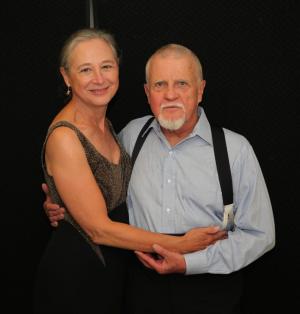
Ellen talks about some of the things that surprised her about the job. One has been her interest in the physical plant and the appearance of the campus, both on the hill and downtown.
“One of the things people always remark about Marlboro College is that it is beautiful. I often describe it as a New England hill village. It’s an apt metaphor, with our Town Meeting and our smallness and our interdependence. It goes to the core of Marlboro’s identity. It has given me very deep pleasure to make it more beautiful.”
Remarkable strides have been made in the past decade. Early in her tenure, Ellen had the pleasure of presiding over the dedication of the Serkin Center for the Performing Arts. In 2006 the Gib Taylor metalworking studio opened, and in 2008 the Total Health Center. In 2011 the core of the campus received a landscaping makeover, and in 2012 the community greenhouse opened, followed by new classroom spaces downtown.
Ellen has added 114 acres and two other buildings to the undergraduate campus in her time here. As she prepares to leave, ground has been broken for the Snyder Center for the Visual Arts, scheduled to open this fall. Her personal vision and fundraising fingerprints are all over most of these projects—just further examples of the network of support for the college that she has built, with “lots of help from others.” Those others include the Marlboro Music School and Festival, based on the undergraduate campus in the summer, a relationship that Ellen has treasured.
Another surprise Ellen notes is how much she came to care about the students, and how much she worried about them.
“I didn’t realize how powerful it would be, watching their struggles and their triumphs. I can’t keep them safe, and I can’t make sure they always make the right decisions, but I want them to have the tools to make good decisions and to have good lives.”
My fondest memories are of Ellen’s personal commitment to Marlboro—a kind word in times of joy and sorrow, her gracious presence in a senior oral, and her ready acceptance of my spontaneous request to read a poem in an Environmental Studies class session for accepted students.
—Jenny Ramstetter, biology faculty
There have been storms to weather—literally. Ellen recalls the night of the 2008 ice storm, when the woods around the president’s house rang with cracks that “sounded like rifles” as trees and limbs fell. That morning Ellen was one of just a few people able to get to campus. She opened the kitchen and ended up flipping pancakes, enlisting students to help.
“We were two and a half days with no power. Nearby faculty and staff walked to campus to help. Dan Cotter and his crew moved generators from building to building.” Ellen recalls the resilience of the students as the power outages went on, finally leading to their being sent home early for the December holidays.
Following that storm, a generous donor provided funds for a generator to cover parts of the center of campus, and Ellen would need it. In 2011 Tropical Storm Irene brought high winds and rain—11 inches in 24 hours. Roads washed out, and the campus was cut off for three days.
“We had new students back from their Bridges orientation trips. The sense of isolation was really extreme. Keeping everybody fed was a challenge. But the community was once again resilient. We ate a lot of rice and beans.”

Ellen has taken an active interest in every area of the college: all of its curriculum, all of the many faculty and staff hires, its alumni, friends, and donors, the Outdoor Program, Town Meeting, long range planning, and current culture. The energy she has brought to all of this is humbling not just because of how hard it is but because of the sincerity of her concern for all these activities and constituencies.
—Tim Segar, visual arts faculty
…
…
Ellen has tackled other crises as well. Perhaps most importantly she has become a national champion of the liberal arts, seeking and achieving a high profile concerning the widespread challenge to what one faculty member calls “the liberating arts.” There has been a lot of debate and a lot of pressure from the White House on down, especially now with greater vocational focus and the monetization of the value of higher education.
“It can be very hard to struggle against the trend—to stand up for liberal education, the broad knowledge and academic skills that the Plan of Concentration is all about. How do we adapt, and how do we fight? How do we continue to present our strengths? I am committed more strongly than ever to finding these answers. I believe in a liberal arts education more fervently than when I wrote that inaugural address. I’m lucky to have the support of trustees who share that belief.”
Ellen chastises herself for not seeing emerging enrollment challenges coming sooner. But she extolls the virtue of collaborations with faculty, staff, students, and trustees to meet these challenges. “A wonderful we,” she says. “Everything I’ve been able to do was with the support of others.” Mostly, she seems at peace with her tenure and a bit nostalgic as she contemplates finishing up.
“I don’t think I fully realized the great pleasures of being part of an intellectual and creative community,” she says. “I will remember moments like giving graduate students diplomas while their children cheer them on, or a recent Work Day spent cleaning up the campus while students talked about their interpretation of Dostoyevsky. It’s a very heady place.”
From the final phrases of Ellen’s inaugural address comes her vision of Marlboro writ simple and clear: “There must be a Marlboro: a place of beauty; a clearing in the forest made for contemplation; a space to create and to become.” Ellen McCulloch-Lovell has made another generation of this dream possible.
Peter Mallary is a Marlboro trustee and the father of a graduate, Rebecca Mallary ’11.
I have had the pleasure of working with Ellen on everything from grant writing to revisiting the role of the dean of faculty. In every instance I have found her wise, compassionate, and creative. Each spring at commencement, Ellen greets every graduating senior as they cross the stage—what may not be visible from down on the floor is her connection to every one of those 70-odd students. This connection is an expression of her grace and warmth, qualities so intrinsic to her demeanor that it is virtually impossible to imagine her without them.
—Seth Harter, Asian studies faculty
Eleven Years with Ellen
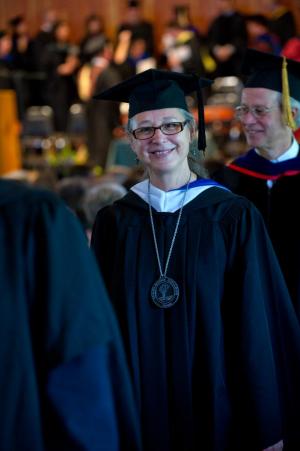
2004
- Inauguration as eighth president of Marlboro College
- Bart Goodwin becomes chairman of board
2005
- Marlboro ranked #1 by Princeton Review for “Professors Bring Material to Life”
- Jerome I. Aron Fund established to support student-faculty collaboration
- Ellen works with community to articulate Four Goals to Guide Marlboro
- Dedication of Serkin Center for the Performing Arts
- Chris Lovell starts Community Trails Day to maintain OP trails
2006
- Dedication of Gib Taylor metalworking studio
- Center for Creative Solutions established to respond to community planning needs
2007
- Marlboro MBA in Managing for Sustainability launched
- 60th Anniversary Fund for Inspired Teaching created
2008
- Grand opening of Total Health Center
- Bridges orientation programs for new students established
- Dedication of Gander Center for World Studies
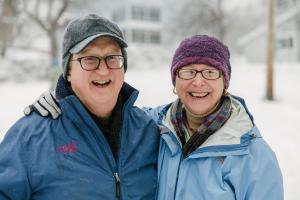
2009
- Marlboro rides out economic storm
- College launches energy efficiency measures with U.S. Department of Energy grant
2010
- Task Force on the Future makes recommendations
- First alumnus board chair, Dean Nicyper ‘76
- Graduate school launches program in nonprofit management
2011
- Center of campus upgraded with walking paths and stone walls
- Marlboro rises to challenge of Tropical Storm Irene
- Global opportunities supported by Christian A. Johnson Endeavor Foundation
-
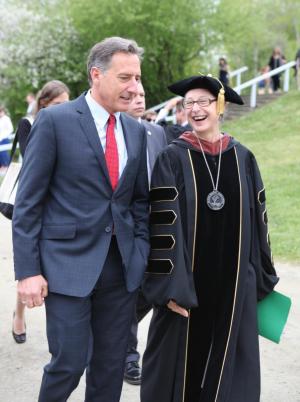
Governor Peter Shumlin, Marlboro College commencement speaker in 2013, shares a light moment with Ellen. Photo by Elisabeth Joffe Marlboro offers dual degree programs through graduate school
- Summer programs for high school students launched
- Margaret A. Cargill Foundation grant supports environmental initiatives
2012
- Movies from Marlboro launched
- Community greenhouse grand opening
2013
- Beautiful Minds Challenge established
2014
- Strategic Plan for Marlboro’s future approved by trustees
- Snyder Center for the Visual Arts groundbreaking
- Cottages renovated with Marlboro Music School
